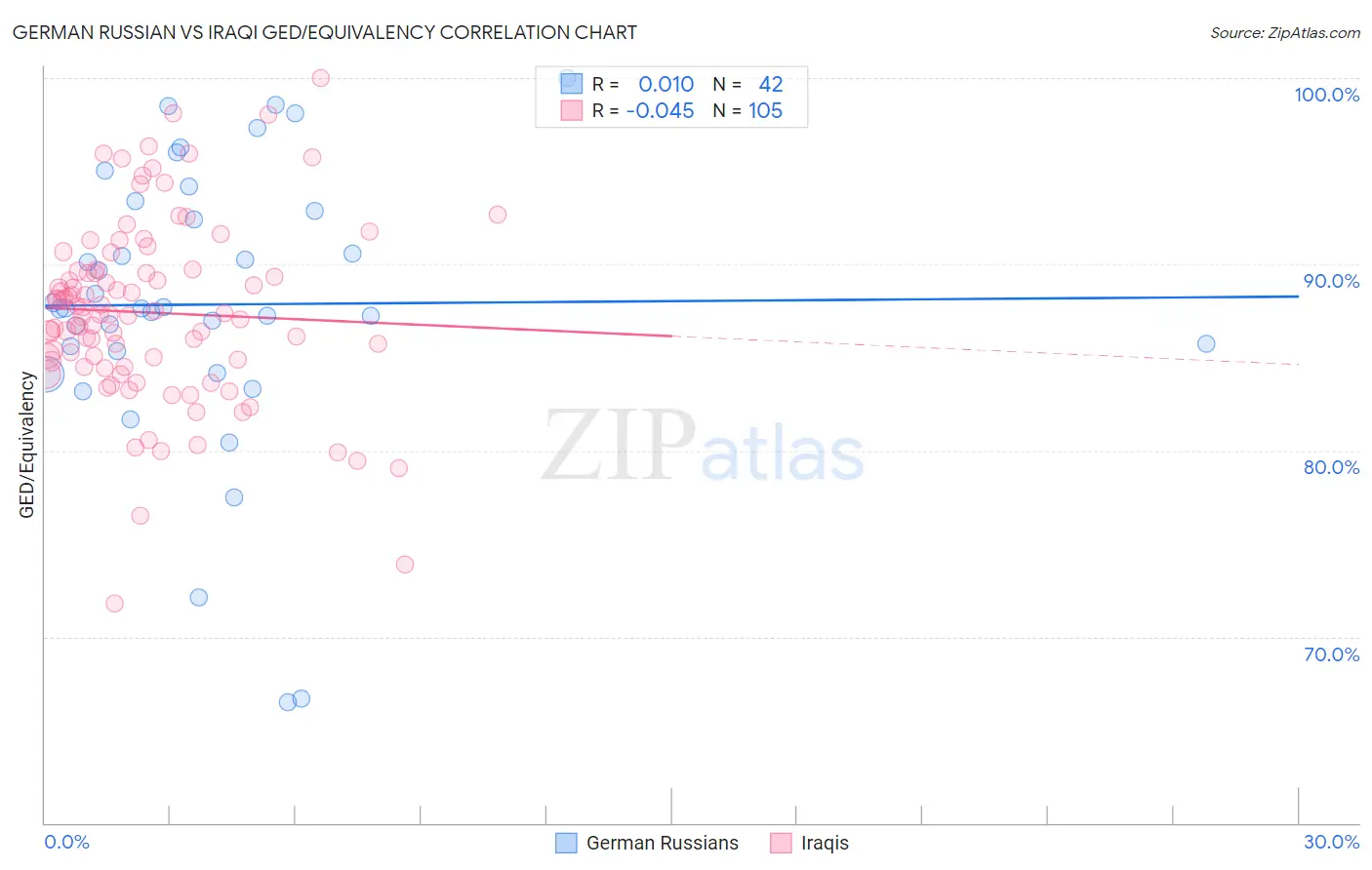German Russian vs Iraqi GED/Equivalency
COMPARE
German Russian
Iraqi
GED/Equivalency
GED/Equivalency Comparison
German Russians
Iraqis
86.2%
GED/EQUIVALENCY
72.1/ 100
METRIC RATING
158th/ 347
METRIC RANK
86.2%
GED/EQUIVALENCY
75.2/ 100
METRIC RATING
155th/ 347
METRIC RANK
German Russian vs Iraqi GED/Equivalency Correlation Chart
The statistical analysis conducted on geographies consisting of 96,461,736 people shows no correlation between the proportion of German Russians and percentage of population with at least ged/equivalency education in the United States with a correlation coefficient (R) of 0.010 and weighted average of 86.2%. Similarly, the statistical analysis conducted on geographies consisting of 170,614,457 people shows no correlation between the proportion of Iraqis and percentage of population with at least ged/equivalency education in the United States with a correlation coefficient (R) of -0.045 and weighted average of 86.2%, a difference of 0.080%.

GED/Equivalency Correlation Summary
| Measurement | German Russian | Iraqi |
| Minimum | 66.5% | 71.8% |
| Maximum | 100.0% | 100.0% |
| Range | 33.5% | 28.2% |
| Mean | 87.8% | 87.4% |
| Median | 87.6% | 87.3% |
| Interquartile 25% (IQ1) | 85.4% | 84.7% |
| Interquartile 75% (IQ3) | 92.9% | 89.7% |
| Interquartile Range (IQR) | 7.5% | 5.0% |
| Standard Deviation (Sample) | 7.6% | 4.9% |
| Standard Deviation (Population) | 7.5% | 4.9% |
Demographics Similar to German Russians and Iraqis by GED/Equivalency
In terms of ged/equivalency, the demographic groups most similar to German Russians are White/Caucasian (86.2%, a difference of 0.0%), Immigrants from Kenya (86.2%, a difference of 0.010%), Immigrants from Nepal (86.2%, a difference of 0.030%), Immigrants from Morocco (86.1%, a difference of 0.060%), and Immigrants from Syria (86.1%, a difference of 0.070%). Similarly, the demographic groups most similar to Iraqis are Armenian (86.3%, a difference of 0.030%), Kenyan (86.3%, a difference of 0.040%), Immigrants from Nepal (86.2%, a difference of 0.050%), Brazilian (86.3%, a difference of 0.060%), and Immigrants from Bosnia and Herzegovina (86.3%, a difference of 0.080%).
| Demographics | Rating | Rank | GED/Equivalency |
| Basques | 79.5 /100 | #146 | Good 86.4% |
| Immigrants | Northern Africa | 79.3 /100 | #147 | Good 86.3% |
| Immigrants | Poland | 79.3 /100 | #148 | Good 86.3% |
| Menominee | 79.3 /100 | #149 | Good 86.3% |
| Immigrants | Western Asia | 78.8 /100 | #150 | Good 86.3% |
| Immigrants | Bosnia and Herzegovina | 77.9 /100 | #151 | Good 86.3% |
| Brazilians | 77.2 /100 | #152 | Good 86.3% |
| Kenyans | 76.6 /100 | #153 | Good 86.3% |
| Armenians | 76.4 /100 | #154 | Good 86.3% |
| Iraqis | 75.2 /100 | #155 | Good 86.2% |
| Immigrants | Nepal | 73.3 /100 | #156 | Good 86.2% |
| Whites/Caucasians | 72.2 /100 | #157 | Good 86.2% |
| German Russians | 72.1 /100 | #158 | Good 86.2% |
| Immigrants | Kenya | 71.8 /100 | #159 | Good 86.2% |
| Immigrants | Morocco | 69.5 /100 | #160 | Good 86.1% |
| Immigrants | Syria | 69.3 /100 | #161 | Good 86.1% |
| Immigrants | Iraq | 68.1 /100 | #162 | Good 86.1% |
| Ugandans | 66.3 /100 | #163 | Good 86.1% |
| Venezuelans | 65.5 /100 | #164 | Good 86.0% |
| Alsatians | 64.3 /100 | #165 | Good 86.0% |
| Immigrants | Albania | 64.2 /100 | #166 | Good 86.0% |